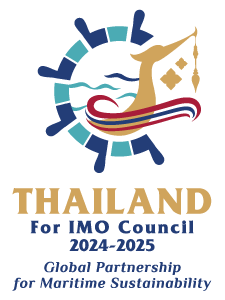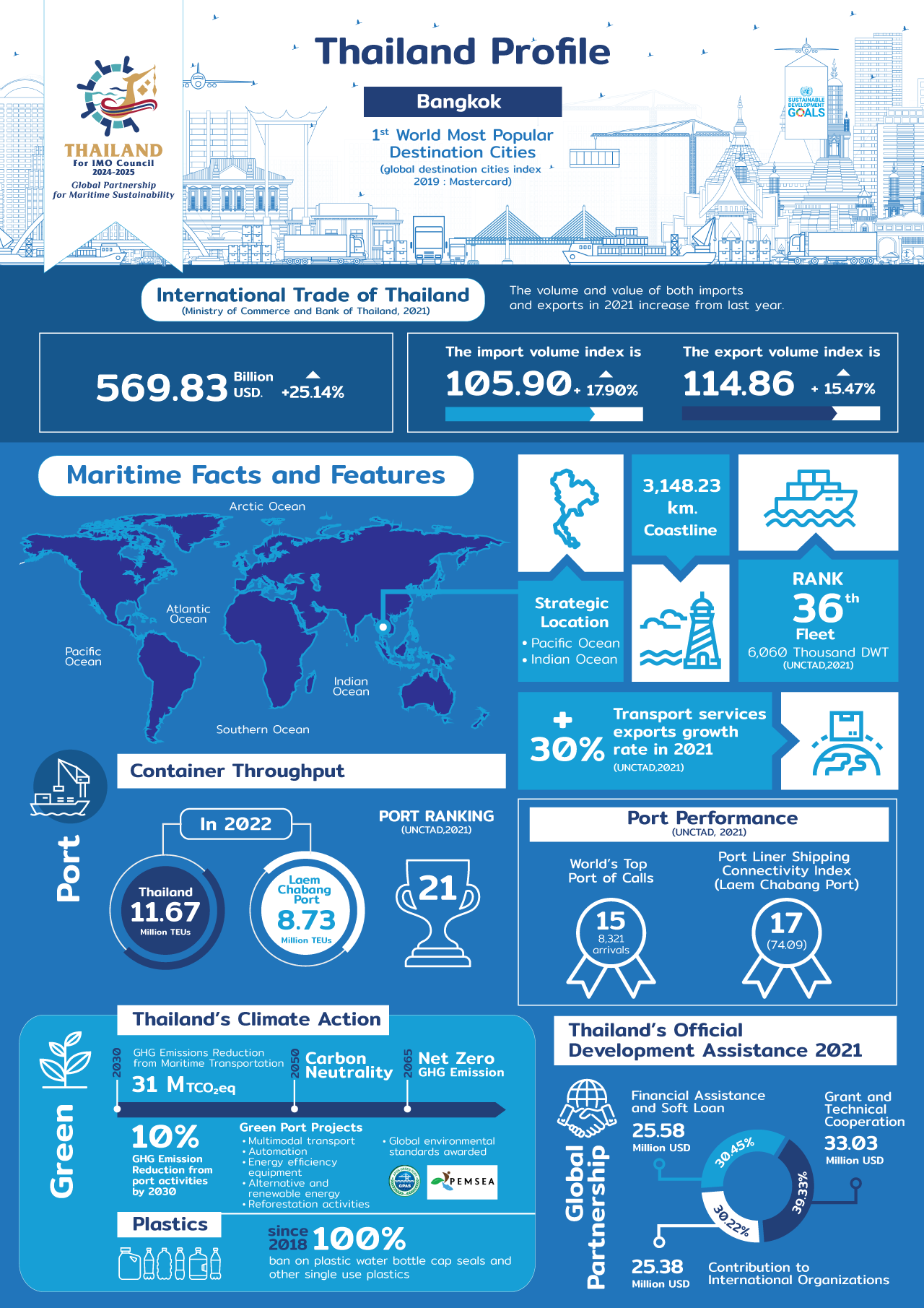International Trade of Thailand
(Ministry of Commerce and Bank of Thailand, 2021)Container Throughput
Thailand
million TEUs
Laem Chabang Port
million TEUs
Port Performance
(UNCTAD, 2021)
Port Ranking
6,060 Thousand DWT
World's Top
Port of Calls
Port Liner Shipping
Connectivity Index

Aide-mémoire for Thailand’s
Candidature for Re-election to the IMO Council
CATEGORY C : 2024 - 2025
Thailand is a maritime nation with a strategic geographical location in Southeast Asia that links
the Pacific and Indian Oceans. Thanks to its strong maritime industry and efficient multimodal
transport networks, Thailand serves as important regional logistics hub as one of the world’s
leading container ports with excellent services.
Being member of the International Maritime Organization (IMO) since 1973, and of the IMO Council
for nearly 20 consecutive years, Thailand has fulfilled its pledges in promoting safe, secure, and
clean oceans. As host country to more than 30 different United Nations agencies and offices,
Thailand looks forward to furthering its work through invaluable partnerships with international
maritime community in achieving inclusive and sustainable global goals, as follows:
Sustainable Development Goals
Thailand incorporates the United Nations’ Sustainable Development Goals (SDGs) into national policies and plans at all levels, and collaborates with all partners on maritime-related issues in order to achieve all relevant jointly determined targets. As the host of the Global South-South Development Expo (GSSD Expo) 2022, which took place last year for the very first time in the Asia Pacific region, Thailand significantly contributed to the signing of a Memorandum of Understanding (MOU) between the IMO and the United Nations Economic and Social Commission for Asia and the Pacific (UNESCAP) with respect to Future Cooperation in the Maritime Sector in the Asia-Pacific Region.
Climate Change
Subject to adequate and enhanced access to technology development, financial resources and capacity building support, Thailand aims to reduce GHG emissions to 40%, compared to BAU by 2030, to which the transport sector contributes 14%. To achieve this target, our action plans call for a reduction of 31 million tonnes of CO2 equivalent emissions through a wide range of transport projects, including maritime activities focused on green technology and innovation. We are committed to the continuous development of electric vessels (EVs) for use in mass transit systems as well as green port projects, providing sustainable, environmentally friendly transportation options for all. We will redouble these efforts in order to meet our ambitious GHG reduction targets and contribute to the decarbonisation of international shipping in line with the Initial IMO Strategy on Reduction of GHG Emissions from Ships.
Marine Debris
Thailand has consistently supported the implementation of the IMO’s and its partners’ efforts by promoting the IMO Action Plan to Address Marine Debris from Ships, as well as a new system of marking fishing gear based on existing regional agreements and instruments of the Food and Agricultural Organization (FAO). We are unwavering in our commitment to taking decisive action to build regional capacity to reduce plastic pollution, and implement our current Action Plan on Plastic Waste Management Under the National Action Plan on Waste Management to address this pressing and urgent issue in an integrated and comprehensive manner. To take this forward, Thailand has set a target to reduce 50% of marine plastic debris by 2027, while also pushing forward marine waste management activities with various stakeholders such as Upcycling the Oceans (Thailand), the Ocean Clean-up, and the Norway-IMOFAO GloLitter.
Thailand and the Work of IMO
As a proactive member of the IMO, Thailand has successfully developed a long-term strategy to uphold the highest standards for safety, security and environmental protection and to timely accede to eight IMO conventions. Thailand reaffirms our full commitment to the work of the IMO to ensure safe and secure shipping in clean oceans and enhance sustainable maritime connectivity. We continue our proactive participation in IMO’s forums, also in capacity as chair of various working groups, in order to serve the common interests of all IMO Members and ensure maximum benefits for the maritime community.
Safeguard of seafarers:
Throughout the pandemic, Thailand continues to recognise seafarers as “Key Workers” and prioritises the safeguard of seafarers’ health and wellbeing to ensure the uninterrupted movement of goods and trade along the supply chain in alignment with the Maritime Labour Convention (MLC) 2006. To maintain the positive momentum even as the pandemic subsides, Thailand will continue to collaborate with all partners to restate response measures, including the development of digital platforms to facilitate seafarer documents for crew change in order to get prepared for future crises. The platforms can be used to promote cadet and seafarer education and provide training to the general public via e-learning.
Sustainable fisheries:
Since the accomplishment of reforming national legislation to combat illegal, unreported, and unregulated (IUU) fishing, Thailand has continued to work closely with FAO and international organisations and established the Network Center for ASEAN to enhance collective efforts to adopt and implement plans against IUU fishing. To ensure full compliance with international obligations, Thailand has adopted an electronic system to record its actions in reducing the impact of fisheries on marine biodiversity.
Innovation for resilient maritime logistics:
To build maritime logistics resilience, Thailand strives to accelerate digitalization by developing advanced platforms to facilitate and harmonise maritime and trade databases with stakeholders, e.g.: Maritime Single Window and Port Community System. This not only enhances the efficiency of maritime administration and operations but also fulfils the requirements of the Convention on the.
Facilitation of International Maritime Traffic (FAL). Moreover, Thailand places importance on the prevention of cyber security in order to ensure maritime transport security and safe and secure application of advanced technology and innovation for maritime sustainability
Knowledge sharing and capacity building
Thailand attaches great importance to the IMO’s work on technical cooperation while reiterating our partnership role as a long-term strategy through the Integrated Technical Cooperation Programme (ITCP) and the World Maritime University. We unceasingly take part in funding for fellowships, training equipment, and learning materials, as well as actively providing expertise in several international maritime projects. Thailand's strategy strongly advocates a timely convening of IMO activities and international maritime forums to accelerate capacity building for IMO Members.
Promoting gender equality:
Thailand stresses its full support for empowering women in the maritime sector through encouraging increased participation of women in maritime administration and industry and establishing career development opportunities at all levels especially on management level as well as supporting women’s representation in international forums as chairperson and speakers.
Thailand, as an IMO Council Member representing a developing country and emerging economy,
will continue our support for developing states in implementing IMO conventions and related instruments by contributing to technical cooperation and capacity building programmes for developing countries, and by hosting the IMO Regional Seminar and events to exchange experiences and best practices. Thailand will proactively seek inclusive and extensive collaboration with all Member States and relevant intergovernmental organisations in achieving appropriate solutions to emerging issues with the view to realising safe, secure, and clean oceans.
Above all, Thailand will place emphasis on IMO’s future directions, e.g., pushing forward initiatives to rectify common deficiencies found in IMO Member States Audit Schemes (IMSAS), Post-COVID disruptions and adjustments in shipping and how international maritime transport contributes to resolving global crisis. We will enhance our long-standing support the works of the IMO, especially in Technical Cooperation, by providing funds to the IMO, conducting IMO regional seminars and granting fellowships, training, and learning materials to Member States on an annual basis as well as cooperating with other UN agencies to strengthen technical cooperation on maritime issues,
in particular sustainable maritime transport, maritime safety and security, domestic ferry safety, and carriage of dangerous cargoes.
To continue fostering a spirit of cooperation and collaboration among IMO Member States while enhancing the global sustainable maritime community, Thailand is pleased to present its candidature for re-election to the Council of the IMO in Category C for the term of 2024–2025.


